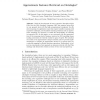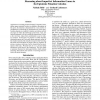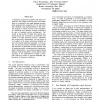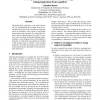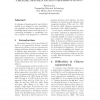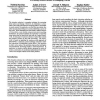136
click to vote
DEXA
2010
Springer
15 years 3 months ago
2010
Springer
With the development of more expressive description logics (DLs) for the Web Ontology Language OWL the question arises how we can properly deal with the high computational complexi...
132
Voted
AAAI
2010
15 years 3 months ago
2010
Approaches to reasoning about knowledge in imperfect information games typically involve an exhaustive description of the game, the dynamics characterized by a tree and the incomp...
118
Voted
IJCAI
1989
15 years 3 months ago
1989
The study of belief revision and reasoning about actions have been two of the most active areas of research in AI. Both these areas involve reasoning about change. However very li...
108
Voted
IJCAI
1989
15 years 3 months ago
1989
In designing autonomous agents that deal competently with issues involving time and space, there is a tradeoff to be made between guaranteed response-time reactions on the one han...
121
click to vote
AAAI
1990
15 years 3 months ago
1990
Commitment to an ontological perspective is a primary aspect of reasoning about the physical world. For complex analytic tasks, the ability to switch between different ontologies ...
149
Voted
AAAI
1990
15 years 3 months ago
1990
Since knowledge bases (KBs) are usually incomplete, they should be able to provide information regarding their own incompleteness, which requires them to introspect on what they k...
140
Voted
IJCAI
1993
15 years 3 months ago
1993
Polynomial time complexity is the usual ‘threshold’ for distinguishing the tractable from the intractable and it may seem reasonable to adopt this notion of tractability in th...
COLING
1994
15 years 3 months ago
1994
A technique of reasoning under uncertainty is studied in all attempt to solve disaml)igua,tion probh;nls of Cilinesc segnlcnliation. A knowlcdge-.I)a,sedinexact reasoning thcory i...
101
click to vote
AAAI
1994
15 years 3 months ago
1994
We introduce a new framework for the study of reasoning. The Learning (in order) to Reason approach developed here views learning as an integral part of the inference process, and ...
134
Voted
AAAI
1994
15 years 3 months ago
1994
The situation calculus is a popular technique for reasoning about action and change. However, its restriction to a firstorder syntax and pure deductive reasoning makes it unsuitab...
